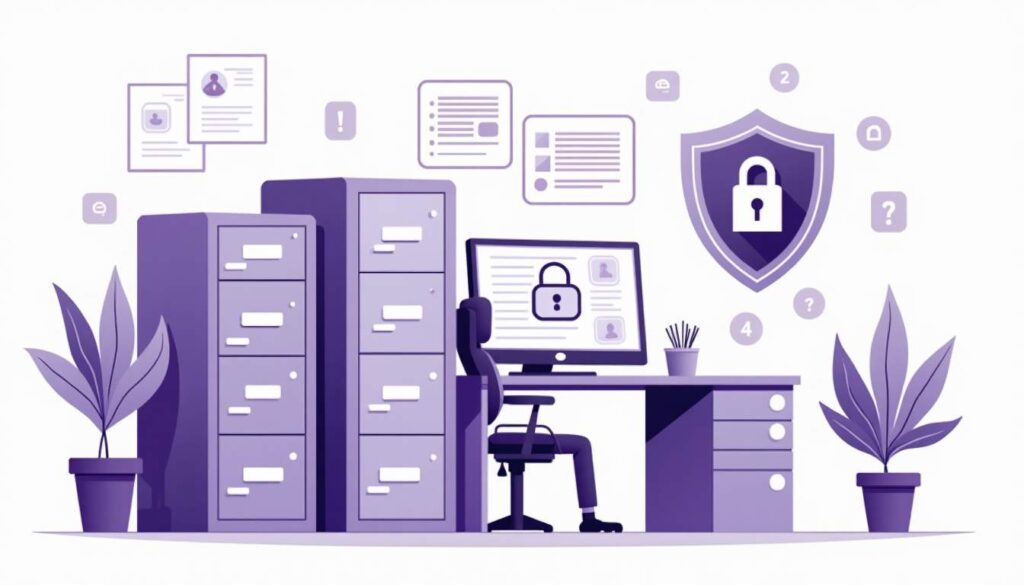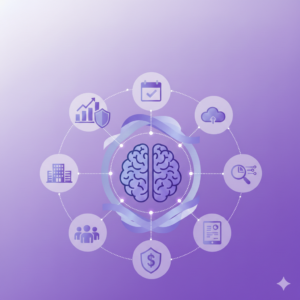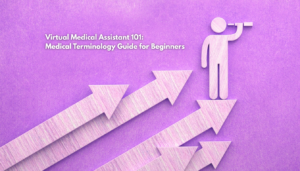Why is HIPAA Important in a Medical Office?
11 Sep 2025 By: Vlade Legaspi
Updated

HIPAA is important in a medical office because it sets clear rules for protecting patient health information and preventing unauthorized access or disclosure. It requires safeguards like limiting who can view records, using secure systems for electronic data, and training staff on privacy. For example, a receptionist can’t share a patient’s diagnosis over the phone without proper authorization. Following HIPAA helps maintain trust and reduces the risk of costly breaches and penalties.
Understanding HIPAA: A Foundation for Patient Privacy

What Is HIPAA?
The federal law HIPAA became effective in 1996 to safeguard medical records and all personal health information of patients. The law sets standardized procedures for protecting and managing protected health information (PHI) during storage and transmission. The law requires all healthcare providers and health plans and healthcare clearinghouses to follow its rules as they are known as covered entities and their business associates must also comply.
The Privacy Rule and Security Rule of HIPAA serve as the core components of this law. The Privacy Rule sets rules for PHI disclosure and usage but the Security Rule sets standards for protecting electronic PHI (ePHI) from unauthorized access and breaches. The regulations create patient-provider trust by establishing detailed rules which ensure complete respect and proper care for sensitive information.
Why Was HIPAA Created?
The United States lacked any specific federal regulations to safeguard patient information prior to HIPAA implementation. Medical offices employed various methods to handle patient data which created higher possibilities for privacy breaches and identity theft incidents.
The transition of health records to digital systems during the 1990s created an urgent requirement for robust protection measures. The transition to digital health records demonstrated the fundamental need for HIPAA to protect data in current times.
HIPAA was created to address these challenges by:
- Ensuring patient health information remains confidential and secure
- Improving the efficiency and effectiveness of the healthcare system
- Facilitating the secure exchange of health information electronically
- Providing patients with greater control over their health information
HIPAA set clear rules for accountability, pushing healthcare groups to follow strong privacy steps. They must run risk checks and train staff on HIPAA rules. This helps build a culture of privacy, where patients trust their data is safe. It shows why HIPAA is important for both safety and trust in care.
HIPAA has changed over time to face new tech and threats. The 2009 HITECH Act raised fines for data leaks and pushed the use of electronic health records. These changes prove the law’s role in guarding privacy as care goes digital. That’s another reason why HIPAA is important in today’s tech-driven world.
The Impact of HIPAA on Medical Office Operations

Protecting Patient Information
Medical offices handle private data daily, like diagnoses, billing, and social security numbers. HIPAA sets strict rules to guard this data from leaks or misuse.
Offices must lock files, use secure tech like encryption, and train staff well. These steps cut the risk of costly breaches. Regular audits and risk checks help find weak spots early. By fixing these issues fast, offices boost their defenses. This shows why HIPAA is important for keeping patient data safe from rising cyber threats.
Enhancing Patient Trust and Confidence
Trust forms the base of the patient-provider bond. Patients must know their health data is kept safe and private. HIPAA helps build that trust by setting clear rules.
When patients trust providers, they follow treatments better and share honest details. This leads to better care. Sharing how data is used builds even more trust. Telling patients their rights under HIPAA, like seeing or fixing records, gives them control. This shows why HIPAA is important in building strong, open healthcare relationships.
Streamlining Administrative Processes
HIPAA sets rules for electronic tasks like billing and claims. This cuts paperwork, reduces mistakes, and speeds up payments, helping offices work better.
The law’s rules use standard codes for claims and payments. This cuts admin costs and eases office work. HIPAA also pushed the use of EHRs, which improve data sharing. Fast access to patient records helps doctors make better choices. It also saves time for care teams. That’s why HIPAA is important for both better care and smoother workflows.
Consequences of Non-Compliance: Why Medical Offices Must Take HIPAA Seriously

Legal and Financial Penalties
HIPAA noncompliance leads to major financial penalties. The U.S. Department of Health and Human Services (HHS) Office for Civil Rights (OCR) enforces HIPAA regulations while imposing penalties that include $100 to $50,000 per violation and up to $1.5 million per year for organizations that violate the rules repeatedly.
Medical facilities that do not follow HIPAA rules will receive monetary penalties through fines and legal consequences and their professional standing will suffer and they will experience increased oversight from regulatory bodies. The OCR recorded more than 600 data breach incidents which revealed information about 500 or more people throughout 2023 thus showing ongoing risks of non-compliance. Small medical practices become financially insolvent because they lack sufficient funds to cover these penalty costs. The healthcare privacy legal structure undergoes changes because state laws create additional compliance obligations for organizations to meet.
Damage to Reputation and Patient Relationships
A data breach or privacy leak can ruin a medical office’s name. Patients may lose trust and switch providers, hurting the office’s money flow and growth. Fixing trust takes time and effort. Damage spreads beyond current patients—bad reviews and news may scare off future ones, causing a long drop in new visits.
The emotional hit on patients also matters. They may feel exposed and fear for their health data. This fear may stop them from sharing key facts later. That silence can block good care and build a trust gap that’s hard to fix. This shows why HIPAA is important and why strong safety steps are a must.
Operational Disruptions
Non-compliance can spark audits that disrupt daily work. Offices may pause services, retrain staff, and follow strict action plans, shifting focus from care. Time and money spent on these fixes can slow operations, cause delays, and lower patient satisfaction.
During audits, staff may face long interviews and must share records, taking them from their main tasks. This chaos can hurt morale and lower work quality. The stress may also lead to burnout, which can drop care standards and hurt the office vibe.
Why Is HIPAA Important for Medical Office Compliance

Implementing Robust Security Measures
Protecting PHI needs many layers. Offices should use secure EHR systems with encryption, access rules, and audit logs. Locking record areas is also key.
Risk checks help spot weak points and guide fixes. In 2023, 72% of healthcare groups with regular checks had fewer data leaks. Tools like biometrics boost safety by letting only approved staff in. This guards patient data and builds trust, as more patients care about their privacy.
Training and Educating Staff
Human error causes many HIPAA violations. Training helps staff learn how to handle PHI, spot phishing, and report problems the right way.
Ongoing lessons are key as rules and tech change. Many offices run yearly HIPAA updates to keep teams sharp. Real-life drills, like role-playing, boost learning. These steps cut risks and help staff own their role in keeping data safe.
Developing Clear Policies and Procedures
Written policies guide HIPAA compliance. They should cover data access, breach plans, patient rights, and how to share info. Clear steps keep actions steady and ease audits.
A set breach plan helps alert patients and officials fast. Naming a HIPAA officer and team keeps policies updated and the office ready. This setup builds trust and shows clear roles.
Engaging with Business Associates Carefully
Medical offices often hire vendors for billing or IT. HIPAA says these vendors must also follow strict privacy and security rules.
Offices need Business Associate Agreements (BAAs) to list each side’s duties. Ongoing checks keep vendors in line. Before signing, offices should review vendor security, past issues, and audit results. This helps protect patient data and builds trust in the system.
The Future of HIPAA and Patient Privacy

Adapting to Technological Advances
As tech grows, so do risks to patient data. Telehealth, apps, and cloud tools need stronger HIPAA rules to stay safe and legal.
AI can boost care but may expose data. Secure design is key to block leaks. Offices must track tech trends and rule changes. During COVID, HIPAA rules eased for telehealth, but new rules are coming. Staff must train on updates to protect data and keep trust high.
Balancing Privacy with Data Sharing
Healthcare now depends on sharing data for care, research, and public health. HIPAA must protect privacy while allowing useful info to flow.
Programs like TEFCA set safe rules for sharing. They boost care and keep patient data private. Offices must check their systems match these rules to stay compliant and support new care models.
Empowering Patients with Greater Control
New rules aim to give patients more control over their data. The 21st Century Cures Act stops info blocking and boosts access to records.
Offices must help patients use data safely. Easy portals with privacy tips can help. As patients ask more questions, clear answers build trust.
TRENDING NOW!
The 1996 HIPAA law protects patient privacy and establishes security measures for healthcare information. The law protects patient privacy through strict rules which prevent unauthorized access to medical data and require healthcare providers to follow precise guidelines. Organizations need to follow legal requirements by implementing encryption methods and secure access systems and employee training programs that prevent unauthorized information disclosure. The Privacy and Security Rules of HIPAA establish specific requirements for health information management which ensures patient data security.
HIPAA provides providers with enhanced care delivery capabilities while supporting their ongoing business expansion. Healthcare organizations need to train their staff and identify potential risks and create effective policies to achieve HIPAA compliance. HIPAA enables patients to maintain their insurance coverage when they experience changes in their employment or personal circumstances. The 21st Century Cures Act and TEFCA demonstrate how HIPAA maintains its position as a modern healthcare technology standard. The ability to stay updated enables healthcare providers to protect patient information while delivering modern digital healthcare services.
Conclusion: HIPAA as a Pillar of Trust and Security in Medical Offices
HIPAA does more than meet rules. It protects privacy, boosts care, and helps offices run better. It builds trust and cuts risks in a fast-changing field.
For offices, HIPAA is key to long-term success. Strong safeguards keep patient data safe and show respect. It’s a smart step toward better care.
Join HelpSquad Health today to stay compliant, protect patient data, and build trust with every visit. Your path to smarter, safer care starts here.
FAQ’s
What is HIPAA, and who has to follow it in a medical office?
HIPAA is a U.S. federal law (effective in 1996) that sets rules for protecting protected health information (PHI). In a medical office, HIPAA applies to covered entities (like healthcare providers) and also to their business associates (vendors who handle PHI, such as billing or IT partners).
Why is HIPAA important in a medical office (and in healthcare overall)?
HIPAA is important in healthcare because it creates clear, enforceable standards for keeping patient information confidential and secure, especially as records moved from paper to digital systems. It also supports safer electronic sharing of health information and improves how healthcare processes run day to day.
Why is HIPAA important to patients?
It helps patients feel safe sharing sensitive health details by limiting how PHI can be used and disclosed. HIPAA also reinforces patient rights, like being able to access records and request corrections, which strengthens trust and can lead to better care.
What kinds of information does HIPAA protect in a medical office?
HIPAA focuses on PHI, things like diagnoses, medical records, billing details, and other identifiers tied to someone’s health information. Medical offices handle this data constantly, which is why HIPAA requires strong safeguards to prevent leaks or misuse.
What happens if a medical office isn’t HIPAA compliant?
Non-compliance can lead to legal and financial penalties, plus reputational damage and operational disruption (like audits, corrective action plans, retraining, and service slowdowns). The article notes enforcement by HHS’s Office for Civil Rights and cites penalty ranges and breach risk as reasons offices take compliance seriously.
What are the core requirements for medical office HIPAA compliance?
The basics include: using layered security (like encryption, access controls, and audit logs), doing risk assessments, training staff to reduce human error, creating clear written policies (including breach response), and appointing ownership (like a HIPAA officer).
How should medical offices handle vendors for HIPAA compliance?
If a vendor may access PHI (billing services, IT support, etc.), HIPAA expects careful oversight, especially through Business Associate Agreements (BAAs) that define responsibilities. The article also recommends reviewing vendor security practices and monitoring them over time.
Where did HelpSquad get the information for this article, and what supports its claims?
HelpSquad’s post is grounded in major HIPAA frameworks and related policy updates it references, HIPAA’s Privacy and Security Rules, the 2009 HITECH Act (which increased penalties and pushed EHR adoption), and modern data-sharing/access initiatives like TEFCA and the 21st Century Cures Act. For official guidance, it’s best to cross-check details against HHS/Office for Civil Rights resources and your organization’s compliance counsel.


